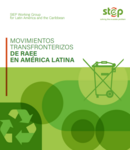
StEP Papers

StEP Papers are developed in a joint effort by members of StEP working groups summarizing their point of view on certain topics.
In the past StEP publications have been divided in White and Green Papers. White Papers state and explain StEP’s position on issues related to e-waste, make recommendations, and provide guidance to relevant stakeholders and decision makers. Green Papers present scientific research findings and/or results.
All StEP Papers are developed on a scientific basis and aim at stimulating discussion inside and outside StEP.

Transboundary movement of WEEE in Latin America
English version | Spanish version
2023-05-07
The StEP Working Group for Latin America has finalised a new paper entitled "Transfronterizos Transfronterizos de RAEE en América Latina" (Transboundary Movements of WEEE in Latin America), which covers a number of topics, such as an overview of the legal situation, current and future trends, and the main barriers and challenges to sound management of WEEE in the Latin American region. The document is available in both Spanish and English.

Future E-waste Scenarios
StEP, UNU, and UNEP IETC have been working extensively on e-waste issues and made an attempt to look into the future of the problem in order to initiate policy level discussions on the challenges and opportunities ahead. Having insight into the future will help policymakers and industries, as well as other stakeholders, to make better strategic decisions.
Download

Global and complementary actions for
electronics extended producer responsibility
2022-10-14
As part of a collaboration for International E-waste Day 2022, StEP, the International Telecommunication Union and the WEEE Forum have prepared this thought paper presenting complementary solutions and concepts to propel e-waste collection rates in line
with EPR-based regulation, whilst also delving into the perceived need for an international regime around EPR to assist with harmonization efforts,
Download

Practical Experiences with the Basel Convention
2022-05-09
This paper aims to gather practical experiences with the export of waste electrical and electronic equipment and fractions thereof (herein referred to as e-waste) from low and middle income countries to environmentally sound management (ESM) facilities abroad according to the Prior Informed Consent (PIC) notification procedures of the Basel Convention.

Partnerships between the informal and the formal sector for sustainable e-waste management
English version | Spanish version
2020-04-08
The main purpose of this paper is to present approaches to and case studies on current informal-formal partnership models in different countries across the world. The partnership concept in this document aims to support the achievement of high recycling rates and legislative requirements, under extended producer responsibility (EPR) or other take-back systems in low and middle-income countries.

Developing Legislative Principles for e-waste policy in developing and emerging countries
2018-02-21
Governments around the world are developing e-waste policies and legislation to deal with the growth of end-of-life electrical and electronic products. The paper presents core legal principles based on Extended Producer Responsibility (EPR) that can be reviewed, contextualised, and adapted by decision makers in countries around the world in order to avoid a ‘copy-paste’ approach from post-industrialised to industrialising country legislation.

Leaded Glass from Cathode Ray Tubes (CRTs)
2016-10-24
As a result of the replacement of cathode ray tube screens (CRTs) by flat screens, the world is confronted with stranded end-of-life CRTs, which contain 1 to 1.5 kg of lead per screen. The paper provides a critical review of products in which CRT leaded glass can replace raw materials as well as current disposal options.

Business Plan Calculation Tool for Manual Dismantling Facilities
2016-01-20
The StEP-Business-Plan-Calculation-Tool supports entrepreneurs to set up an economic viable e-waste recycling business in an environmental sound manner. It can be further helpful for policy makers to understand the present economic framework conditions for e-waste recycling in their region. This paper gives an introduction into the design and structure of the calculation tool explaining its features. Further, possible use and benefits are illustrated.

Guiding Principles to Develop E-waste Management Systems and Legislation
2016-01-18
The guiding principles are intended to provide guidance to all stakeholders mainly in developing countries to define solutions for e-waste management. The principles resulted from the compilation of a SWOT analysis of 13 existing e-waste management systems and pieces of legislation enacted in various regions of the world.